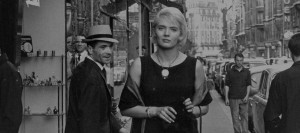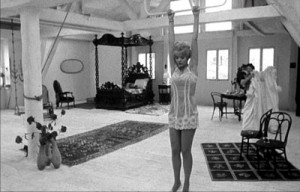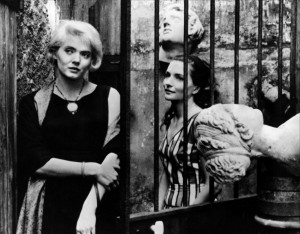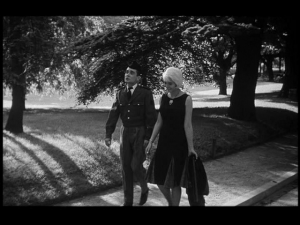From the Chicago Reader (February 1, 1997). I had a great time talking to Varda about this film at Chicago’s Music Box on October 14, 2015. — J.R.


Agnes Varda’s 1961 New Wave feature — recounting two hours in the life of a French pop singer (Corinne Marchand) while she waits to learn from her doctor whether she’s terminally ill — is arguably her best work, rivaled only by her Vagabond (1985) and The Gleaners and I (2000). Beautifully shot and realized, this film offers an irreplaceable time capsule of Paris, and fans of Michel Legrand won’t want to miss the extended sequence in which he visits the heroine and rehearses with her. The film’s approximations of real time are exactly that — the total running time is 90 minutes — but innovative and thrilling nonetheless. Underrated when it came out and unjustly neglected since, it’s not only the major French New Wave film made by a woman, but a key work of that exciting period — moving, lyrical, and mysterious. With Antoine Bourseiller. In French with subtitles. (JR)

 Read more
Read more
From Monthly Film Bulletin, December 1974 (Vol. 41, No. 491).
It’s really a pity that the version of California Split that eventually came out
on DVD, due to musical clearances, had to eliminate some of the play with
Phyllis Shotwell’s songs alluded to here. (For a much later consideration of
this film, including these changes, go here.) — J.R.

CALIFORNIA SPLIT
U.S.A., 1974Director: Robert Altman

In a poker game at a gambling casino near Los Angeles, Charlie
Waters, a winner, is accused by Lew, a sore loser, of playing in
cahoots with the dealer, Bill Denny. Bill and Charlie become
acquainted afterwards in a nearby bar and get cheerfully drunk
together; outside, they are beaten up by Lew (with the help of
friends), who makes off with their winnings. Charlie invites
Bill to stay over at his house, which he shares with two
prostitutes, Barbara and Susan. In the morning, Bill returns to
his job on a glossy magazine but is persuaded to take off that
afternoon and join Charlie at the racetrack, where they make
a small fortune on one of Charlie’s hunches. Wanting to celebrate
with Barbara and Susan, they pretend to be policemen in order to
intimidate the girls’ transvestite client “Helen” and persuade
him to leave, then go to a prizefight. Read more






